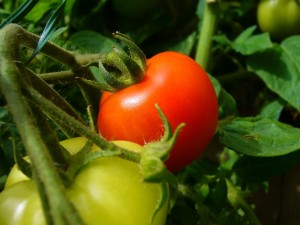On the 10th of May 1893, in the case of Nix.C Hedden, the United states supreme court ruled that tomatoes are vegetables and not fruits. The dispute began 10 years previously when American congress approved a new law on tariffs according to which imported vegetables were subjected to higher taxes. Fruits on the other hand did not require any additional duties on imports. The law was disputed and criticised at the time. Among the main critics of the law was the plaintiff (the Nix family) who had been importing tomatoes until that moment from the West indies. The collector of the port of New york (Hedden) imposed a duty on tomatoes because he considered tomatoes as vegetables.
The plaintiffs paid the duties for a few years but in 1887 they decided to take Hedden to court and attempted to get back their taxes on the ground that tomatoes were fruits and not vegetables.
From a botanical point of view the Nix were right in saying that tomatoes were fruits. Botanists in fact consider a fruit the ovary of a flowering plant (some times including accessory structures). According to the Concise Oxford dictionary of botany a fruit is defined as “strictly the ripened ovary of a plant and its contents. The term is extended to the ripened ovary and seeds together with any structure with which they are combined”. Real fruits develop and contain seeds within the fruit (oranges, plums or peaches). Tomatoes are similar to grapes, tomato grows in a vines and are considered a berries and berries are fruits.
Common vegetables are actually fruits and these include cucumbers, peppers, eggplants and of course tomatoes. Vegetables in botanical sense include all other edible parts of a plant that aren’t fruit, this includes roots, stems, leaves and tubers in this category we can include examples such as potatoes, fennels, carrots, onions.
Nix had a strong argument in favour and with this they confronted Hedden in a dispute that lasted six years. The defence agreed that tomatoes were of course a fruit in a botanical sense but argued that from a commercial point of view tomatoes were considered a vegetable and this is what mattered for the law.
The verdict was reached unanimously by the supreme court of the United States which in a brief sentence argued that although tomato was botanically a fruit, this was normally served at dinner, with fish soup and meat and all first courses meals while fruit was normally consumed after meals as a dessert. Therefore thee judge called for common sense: for most people tomatoes were consumed as a vegetable and this is how it was to be identified as and thus taxed as, a vegetable for the puroposes of the Tarif of 1883 of imported produce.
The Judge also recalled how on a previous verdict the Supreme court had to decide whether beans were to be considered seeds or vegetables. Also in this case the court called for common sense. Both are seeds in botanically but in commercial terms this is not so.
